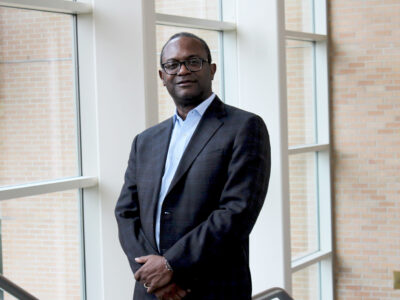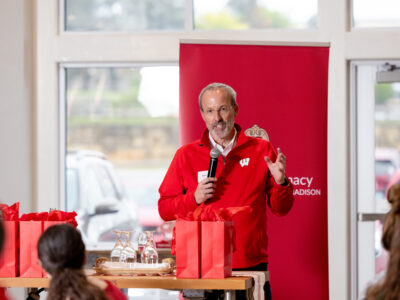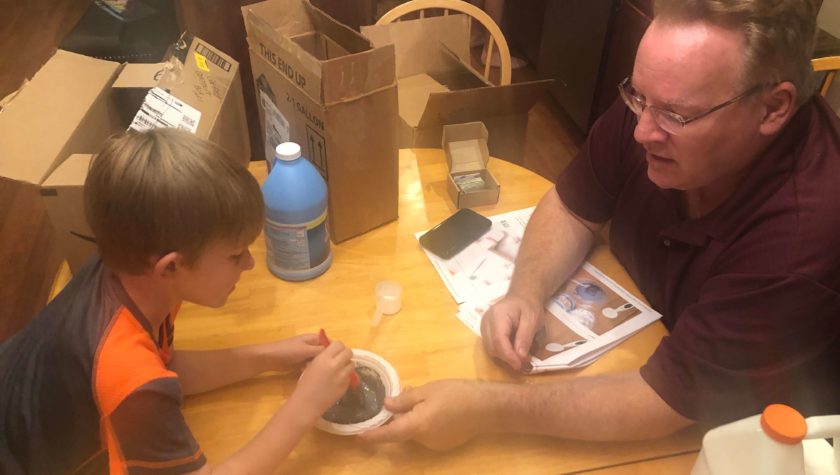
1
March

Like a detective hunting down clues, PharmTox alumnus Robert Jolly is solving questions to improve drug and occupational safety assessments
By Katie Ginder-Vogel
Living up in Winneconne Wis., Robert Jolly (BS ’87) says, “I always wanted to be a Badger.”
His father, an MD-PhD with a background in pharmacology, moved around the country with his family for management positions at organizations such as the U.S. Food and Drug Administration (FDA) and pharmaceutical companies like Mallinckrodt and Roche. Jolly’s early childhood was in Stamford, Conn., nearby where his father ran his own business.
“We’d drive into New York City to research school science projects at the Museum of Natural History,” Jolly recalls.
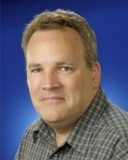
When Jolly’s father took a position at Kimberly-Clark, the family landed in Winneconne, and Jolly found himself beginning middle school in rural Wisconsin. After figuring out what FFA stood for, among other cultural landmines, Jolly settled into life in the small Midwest town and kept his eyes on college at UW–Madison.
When Jolly was accepted to UW–Madison, he already knew he wanted to follow in his dad’s footsteps and study pharmacology and toxicology, especially toxicology.
“I thought it was cool thinking about specific molecules interacting with specific receptors in the body to cause some dramatic biological effect,” Jolly says.
Finding the PharmTox major
Jolly began college as a pre-pharmacy student. In his freshman year in zoology lab, the students went around the room sharing what they hoped to do in college and professionally.
“I stood up and said, ‘I want to do drugs,’” says Jolly, laughing. His tongue-in-cheek comment got exactly the response he needed to hear. “Immediately after class, another student pulled me aside and said, ‘I have a major for you.’ It was Jack Vanden Heuvel.”
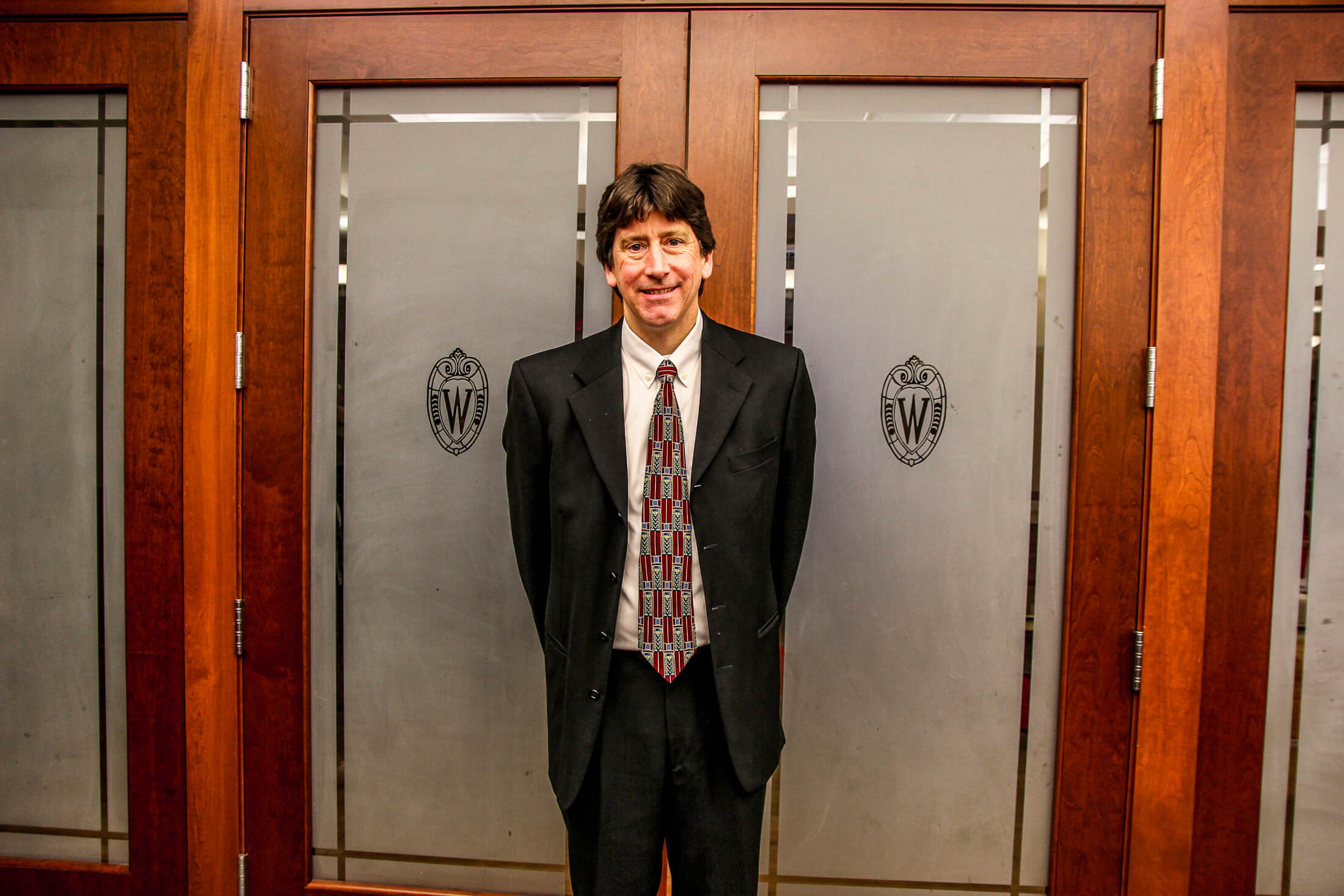
Vanden Heuvel, who was the first Pharmacology and Toxicology major at the UW–Madison School of Pharmacy and named PharmTox Alumnus of the Year in 2018, had taken it upon himself to recruit other students to the new undergraduate program at the School of Pharmacy.
Jolly was among the first students to declare PharmTox as a major. He still jokes, “I was top five in my class…of course there were only five of us! Needless to say, I really enjoyed my time at Madison! On, Wisconsin!”
Because the PharmTox curriculum includes graduate-level courses in biochemistry and molecular biology, Jolly found himself taking classes taught by top scientists in the field, including faculty from other UW–Madison departments, such as Nobel laureates Jack Gorski, biochemistry professor, and James Crow, genetics professor.
“Professor Crow was my favorite professor of all time,” says Jolly. “The topic of population genetics intimidates people, but it was amazing how simply he taught it. His stories of other famous scientists were just funny and engrossing.”
To narrow down his interests, Jolly took advantage of the PharmTox curriculum’s broad research opportunities in a variety of scientific laboratories. For a while, he worked in the lab of Professor Emeritus Dick Peterson in the School’s Pharmaceutical Sciences Division. “I did everything from washing dishes to lending a hand with experiments in the lab and helping with animal studies,” he remembers.
Later, “I was lucky enough to get into Professor Catherine Reznikoff’s lab in the UW Department of Human Oncology, for a summer project demonstrating that a bladder carcinogen could transform human cells and result in tumors in nude mice. They published that work later down the road,” says Jolly. “I was also able to land a summer internship at DuPont Critical Care where I was able to learn screens in cardiovascular pharmacology.”
Although the PharmTox program offered students a natural path to graduate school, Jolly felt uncertain about entering a PhD program after graduation.
“I was leaning toward joining the Peterson Lab to earn a PhD in Pharmaceutical Sciences. I went into his office one day and looked at his desk, and he had a hiring flier from Upjohn,” says Jolly. Something clicked. “I called them, and two days later, I had interviewed for five positions and was offered three jobs. It’s not that easy these days, but my degree and my work experience really gave me the edge at that time.”
Exploring the possibilities
Jolly decided to join Upjohn’s investigative toxicology lab, which he says had every instrument he could imagine. The team was charged with understanding the mechanisms of toxicity in drug development and to help solve toxicology issues that arose with drug candidates.
“I was in that area of toxicology for 22 years—10 at Upjohn, five at Abbott, and seven at Lilly. At Abbott, I had the same role, but more genomics-based,” he says. “I got to be part of designing one of the first rat genomic databases ever published, looking for patterns of toxicity using prototypical toxins.” Jolly has authored or co-authored 50 peer-reviewed publications in his career.
After leaving Abbott, Jolly, his wife Cindy, and their six children moved to Indianapolis, and he took on a similar role in investigative toxicology at Eli Lilly in 2002.
“I’ve never had a time where I didn’t enjoy going to work. My job and career has been fantastic. I’ve been involved in bringing drugs to the market, and to me, that’s pretty cool and time well spent.” —Robert Jolly
Ten years ago, Jolly decided it was time to leave the lab and move into a new role.
“I was looking for the next evolution in my career, and the risk assessment toxicologist role came to my attention,” he says. “It’s a niche role of scientists in the industry. It was interesting to learn about other roles for toxicologists in industry, like forensic and regulatory toxicology, for example, but risk assessment toxicology is even more niche.”
Jolly’s position as a risk assessment toxicologist at Eli Lilly focuses on two key areas: workplace safety and product safety.
“Both areas use pharmacology and toxicology data on compounds,” Jolly says. “We use preclinical and clinical data to determine what is considered to be a safe level for a compound, based on the best data we have.”
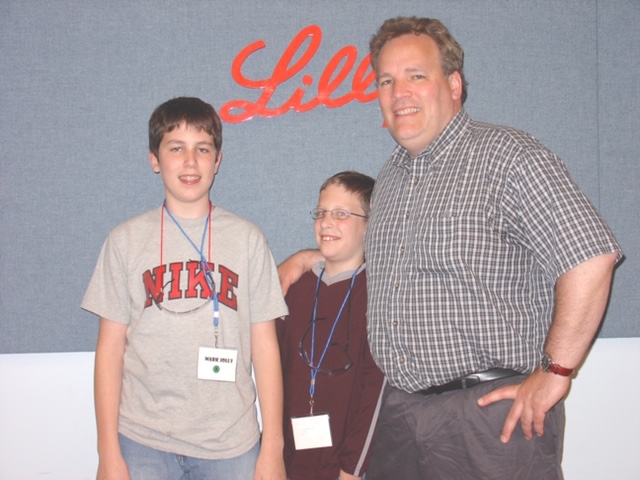
For product safety, risk assessment toxicologists track and evaluate impurities, raw materials, and chemicals in active pharmaceuticals to make sure appropriate levels aren’t exceeded. They use risk assessment frameworks to say what’s considered to be a safe exposure. For occupational safety, the same datasets are used to set threshold exposure limits for the workplace exposure in manufacturing and lab areas.
“My role feels directly impactful to the business,” says Jolly. “We set the limits in early development for our drugs, and we also evaluate anything that can leach out of plastic or device components. We get to look at all the available data for every molecule with the ultimate goal of determining what the risk of exposure is.”
Jolly says every scenario is different. “I like it; it’s interesting,” he says. “I get to do detective work, asking, ‘Where did this come from? What’s the root cause? How does this get mitigated? What is the risk to patients?’”
Taking on new challenges
In 2015, 28 years after graduating from UW–Madison, Jolly earned a Certificate in Public Health and then went on to get his MPH from Indiana University at the Fairbanks School of Public Health, both focused on environmental science.
“I learned additional information to support my career change into risk assessment,” Jolly says. “I did a project evaluating indicators of asthma in rural Indiana counties. It was eye opening to see how different public health can be from pharmaceutical science—how big the challenges are, for example, with lead leaching from pipes in certain communities, or water aquifers getting contaminated from local garbage dumps or closed factories. It definitely gave me new perspective on risk assessment.”
Jolly has been able to stretch his skills in surprising new ways at Eli Lilly. Lilly and the Lilly Foundation support employee volunteerism with numerous programs, including the STEM Partnership Program, a science coaching program in which Lilly employees use the FOSS curriculum developed by the Lawrence Hall of Science at the University of California, Berkeley, to teach hands-on science lessons to children from kindergarten to eighth grade.
“We teach lessons on magnetism and velocity,” says Jolly, who has become a “super coach” after eight years of volunteering in K4-K5 elementary schools. “The intent is to demystify science and make it fun. I’m very passionate about it, and the fact that Lilly supports this time commitment is amazing.”
Advice on landing a career you love
The career possibilities of a PharmTox degree are so vast that he cautions against getting pigeonholed too early.
“Try to get as much experience as you can—it doesn’t matter what it is,” he says. “No task is too menial, and believe me, toxicology has plenty of menial tasks!”
Jolly’s best career advice is to try to find something you love to do, and then it won’t feel like work, and you’ll be able to stick with it for a long time. For him, “there is nothing better than a well-designed experiment that goes off without a hitch and gives you an answer, regardless of whether it was the one you were expecting.”
Jolly adds, “I’ve never had a time where I didn’t enjoy going to work. My job and career has been fantastic. I’ve been involved in bringing drugs to the market, and to me, that’s pretty cool and time well spent.”


